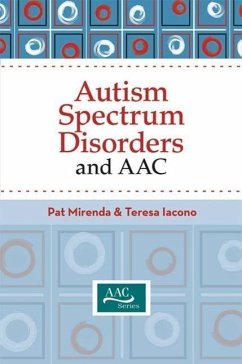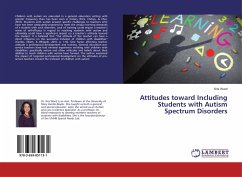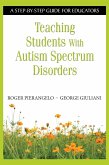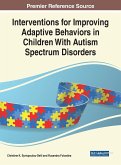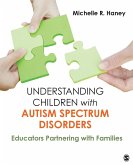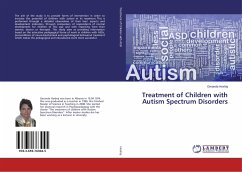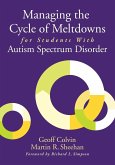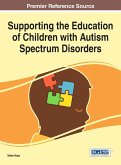Rae Sonnenmeier
Autism Spectrum Disorders and Aac
Herausgeber: Mirenda, Pat; Reichle, Joe; Beukelman, David R; Iacono, Teresa
Rae Sonnenmeier
Autism Spectrum Disorders and Aac
Herausgeber: Mirenda, Pat; Reichle, Joe; Beukelman, David R; Iacono, Teresa
- Gebundenes Buch
- Merkliste
- Auf die Merkliste
- Bewerten Bewerten
- Teilen
- Produkt teilen
- Produkterinnerung
- Produkterinnerung
For children, adolescents, and adults with autism, AAC can have a tremendous positive impact on communication, social skills, and behavior. Now there's a comprehensive, up-to-date research volume that shows professionals what today's most effective AAC methods are????????????????????????and why they're a perfect fit with a variety of learning approaches that work for people with autism. Pat Mirenda????????????????????????a leading authority on AAC and autism????????????????????????and Teresa Iacono partner with more than 30 other experts to give readers the most current, in-depth information…mehr
Andere Kunden interessierten sich auch für
![Attitudes toward Including Students with Autism Spectrum Disorders Attitudes toward Including Students with Autism Spectrum Disorders]() Kris WardAttitudes toward Including Students with Autism Spectrum Disorders26,99 €
Kris WardAttitudes toward Including Students with Autism Spectrum Disorders26,99 €![Teaching Students with Autism Spectrum Disorders Teaching Students with Autism Spectrum Disorders]() Roger PierangeloTeaching Students with Autism Spectrum Disorders93,99 €
Roger PierangeloTeaching Students with Autism Spectrum Disorders93,99 €![Interventions for Improving Adaptive Behaviors in Children With Autism Spectrum Disorders Interventions for Improving Adaptive Behaviors in Children With Autism Spectrum Disorders]() Interventions for Improving Adaptive Behaviors in Children With Autism Spectrum Disorders230,99 €
Interventions for Improving Adaptive Behaviors in Children With Autism Spectrum Disorders230,99 €![Understanding Children with Autism Spectrum Disorders Understanding Children with Autism Spectrum Disorders]() Michelle R. HaneyUnderstanding Children with Autism Spectrum Disorders106,99 €
Michelle R. HaneyUnderstanding Children with Autism Spectrum Disorders106,99 €![Treatment of Children with Autism Spectrum Disorders Treatment of Children with Autism Spectrum Disorders]() Geranda HoxhajTreatment of Children with Autism Spectrum Disorders50,99 €
Geranda HoxhajTreatment of Children with Autism Spectrum Disorders50,99 €![Managing the Cycle of Meltdowns for Students With Autism Spectrum Disorder Managing the Cycle of Meltdowns for Students With Autism Spectrum Disorder]() Geoff ColvinManaging the Cycle of Meltdowns for Students With Autism Spectrum Disorder41,99 €
Geoff ColvinManaging the Cycle of Meltdowns for Students With Autism Spectrum Disorder41,99 €![Supporting the Education of Children with Autism Spectrum Disorders Supporting the Education of Children with Autism Spectrum Disorders]() Supporting the Education of Children with Autism Spectrum Disorders202,99 €
Supporting the Education of Children with Autism Spectrum Disorders202,99 €-
-
-
For children, adolescents, and adults with autism, AAC can have a tremendous positive impact on communication, social skills, and behavior. Now there's a comprehensive, up-to-date research volume that shows professionals what today's most effective AAC methods are????????????????????????and why they're a perfect fit with a variety of learning approaches that work for people with autism. Pat Mirenda????????????????????????a leading authority on AAC and autism????????????????????????and Teresa Iacono partner with more than 30 other experts to give readers the most current, in-depth information on a wide range of AAC methods and technologies. Through clear and compelling examinations of the latest research studies, professionals supporting people with autism will discover how these evidence-based AAC interventions can be used.
Hinweis: Dieser Artikel kann nur an eine deutsche Lieferadresse ausgeliefert werden.
Hinweis: Dieser Artikel kann nur an eine deutsche Lieferadresse ausgeliefert werden.
Produktdetails
- Produktdetails
- Verlag: Brookes Publishing Company
- Seitenzahl: 504
- Erscheinungstermin: 1. Dezember 2008
- Englisch
- Abmessung: 234mm x 160mm x 33mm
- Gewicht: 937g
- ISBN-13: 9781557669537
- ISBN-10: 1557669538
- Artikelnr.: 24181886
- Herstellerkennzeichnung
- Libri GmbH
- Europaallee 1
- 36244 Bad Hersfeld
- gpsr@libri.de
- Verlag: Brookes Publishing Company
- Seitenzahl: 504
- Erscheinungstermin: 1. Dezember 2008
- Englisch
- Abmessung: 234mm x 160mm x 33mm
- Gewicht: 937g
- ISBN-13: 9781557669537
- ISBN-10: 1557669538
- Artikelnr.: 24181886
- Herstellerkennzeichnung
- Libri GmbH
- Europaallee 1
- 36244 Bad Hersfeld
- gpsr@libri.de
Dr. Mirenda earned her doctorate in behavioral disabilities from the University of Wisconsin-Madison. For 8 years, she was a faculty member in the Department of Special Education and Communication Disorders, University of Nebraska-Lincoln. From 1992 to 1996, she provided a variety of training, research, and support services to individuals with severe disabilities through CBI Consultants, Ltd., in Vancouver, British Columbia. She is now Professor in the Department of Educational and Counseling Psychology and Special Education at the University of British Columbia. From 1998 to 2001, she was editor of the journal Augmentative and Alternative Communication. In 2004, she was named a Fellow of the American Speech-Language-Hearing Association and was awarded the Killam Teaching Prize at the University of British Columbia. In 2008, she was named a Fellow of the International Society for Augmentative and Alternative Communication. Dr. Mirenda is the author of numerous book chapters and research publications; she lectures widely and teaches courses on augmentative and alternative communication, inclusive education, developmental disabilities, autism, and positive behavior support. Her current research focuses on describing the developmental trajectories of young children with autism and factors that predict the outcomes of early intervention. Teresa Iacono, Ph.D., Associate Professor and Senior Research Fellow, Director of Research, Centre for Developmental Disability Health Victoria, Monash University, 270 Ferntree Gully Road Building 1, Notting Hill, Victoria, 3166, Australia Dr. Iacono earned her doctorate in Special Education and Communication Disorders at the University of Nebraskaâ "Lincoln. She is a speechlanguage pathologist, having received her B.App.Sc. and M.App.Sc. 00Mirenda(F)-FM 10/21/08 1:48 PM Page xiii degrees in speech pathology in Australia. For 9 years she was an academic member of Macquarie University, where she co-convened a Masters in Communication Disorders within the Department of Linguistics and taught within the Institute of Early Childhood; she also held an honorary position within Macquarie University Special Education Centre. Her clinical, teaching, and research work has focused on developmental disabilities and complex communication needs. In her position at the Centre for Developmental Disability Health Victoria, this focus has extended to physical and mental health issues of adults with developmental disabilities. Dr. Iacono is the author of chapters and research publications concerning communication and health and well-being in developmental disabilities. She was editor of the journal Augmentative and Alternative Communication from 2002 to 2004. In 2007, she was a recipient of the inaugural National Health and Medical Research Council (Australia) Ethics Award for her work addressing ethical concerns of including people with developmental disabilities in research. David R. Beukelman, Ph.D was the Barkley Professor of Communication Disorders at the University of Nebraska-Lincoln, Director of Research and Education of the Communication Disorders Division, Munroe/Meyer Institute of Genetics and Rehabilitation at the University of Nebraska Medical Center, a research partner in the Rehabilitation Engineering and Research Center in Augmentative and Alternative Communication, and a senior researcher in the Institute for Rehabilitation Science and Engineering at the Madonna Rehabilitation Hospital. With Pat Mirenda, he co-authored the textbook, Augmentative and Alternative Communication: Management of Severe Communication Disorders in Children and Adults. He served as editor of the Augmentative and Alternative Communication Journal for four years. Joe Reichle, Ph.D., Professor, Speech-Language-Hearing Sciences, 115 Shevlin Hall, 164 Pillsbury Drive Southeast, University of Minnesota, Minneapolis, Minnesota 55455 Dr. Joe Reichle holds appointments in the Departments of Speech-Language-Hearing Sciences and Educational Psychology at the University of Minnesota. He is an internationally recognized expert in the areas of augmentative communication and communication intervention for persons with significant developmental disabilities and has written over 100 articles and chapters. Dr. Reichle has co-edited 10 books focused on his areas of expertise. He has served as a co-editor of the flagship journal (Journal of Speech-Language-Hearing Research) of the American Speech-Language and Hearing Association. Dr. Reichle was a former Associate Chair of the Department of Speech-Language-Hearing Sciences. During his 33-year career he has served as a PI, co-PI, and investigator on numerous federally funded projects. Currently, he is the Director of the University of Minnesota's Leadership Training Program in Neurodevelopmental Disabilities. Michael Arthur-Kelly, Ph.D., is Senior Lecturer, Centre for Special Education and Disability Studies and The University of Newcastle in Australia. Andy Bondy, Ph.D., Dr. Bondy has almost 50 years of experience working with children and adults with autism and related developmental disabilities. For more than a dozen years, he served as the director of a statewide public school program for students with autism. He codeveloped the Picture Exchange Communication System (PECS) and designed the Pyramid Approach to Education as a comprehensive combination of broad-spectrum behavior. Dr. Bondy cofounded Pyramid Educational Consultants, Inc., an internationally based team of specialists from many fields promoting the principles of applied behavior analysis within functional activities and an empha-sis on developing functional communication skills. He was the recipient of the 2012 Society of the Advancement of Behavior Analysis (SABA) Award for International Dissemination of Behavior Analysis. Karen A. Erickson, Ph.D., David E. and Dolores J. Yoder Distinguished Professor, Director, Center for Literacy and Disability Studies, University of North Carolina at Chapel Hill Karen A. Erickson is Yoder Distinguished Professor and Director of the Center for Literacy and Disability Studies at the University of North Carolina at Chapel Hill. A former teacher of children with significant disabilities, Dr. Erickson's current research addresses literacy and communication assessment and intervention for students with a range of disabilities, including significant disabilities. Dr. Erickson is codeveloper of the Tar Heel Reader online library of accessible books for beginning readers as well as several other assistive, learning, and communication technologies. Lori Frost, Co-founder, Pyramid Educational Consultants, Inc., 13 Garfield Way, Suite 1, Newark, Delaware 19713. Ms. Frost is Vice-President and Co-founder of Pyramid Educational Consultants, Inc., as well as a coauthor of the Picture Exchange Communication System (PECS) Training Manual. Ms. Frost has been the driving force behind creating PECS, a unique system that allows children with limited communication abilities to initiate communication with teachers, parents, and peers. She has a wealth of background in functional communication training and applied behavior analysis. Cheryl M. Jorgensen, Ph.D., is an inclusive education consultant in private practice after being a project director with the Institute on Disability at the University of New Hampshire (UNH) and an assistant research professor in UNH's Education Department from 1985 to 2011. She is a co-founder of the National Center on Inclusive Education. Jorgensen has authored several books (including The Inclusion Facilitatorâ (TM)s Guide and The Beyond Access Model) and research articles; presents at state, national, and international conferences; and provides student-specific consultation throughout the United States. David A. Koppenhaver, Ph.D., Professor, Department of Reading Education and Special Education, Appalachian State University David A. Koppenhaver is Professor in the Reading Education and Special Education Department at Appalachian State University. His Dr. Koppenhaver's research focuses on literacy in individuals with signifi cant disabilities, including those with complex communication needs. He and David Yoder cofounded the Center for Literacy and Disability Studies at the University of North Carolina at Chapel Hill in 1990. Amy C. Laurent is a pediatric occupational therapist who holds a master's degree in special education. Currently in private practice, she is a New England affiliate of Communication Crossroads and of Childhood Communication Services. Ms. Laurent specializes in the education of children with autism spectrum disorders (ASD) and related developmental disabilities. Through her practice, she provides comprehensive evaluations, direct therapeutic services, and consultations to educational programs for children with ASD. She also provides extensive educational and emotional support for families of children with ASD. Ms. Laurent has co-authored several journal articles and frequently lectures throughout the United States on topics related to therapeutic and educational intervention for children with ASD. Her areas of clinical interest include therapeutic intervention as it relates to the development of self-regulation and social-adaptive functioning across contexts (e.g. school, home, and community settings). Janice Light, Ph.D., is a Professor in the Department of Communication Disorders at the Pennsylvania State University. She is actively involved in research, personnel preparation, and service delivery in the area of augmentative and alternative communication (AAC). Her primary interest has been furthering understanding of the development of communicative competence and self-determination by individuals who require AAC. Dr. Light is the principal investigator on several federally-funded research grants to improve outcomes for individuals who have significant communication disabilities through the use of augmentative and alternative communication. She is one of the project directors in the Augmentative and Alternative Communication Rehabilitation Engineering Research Center (AAC-RERC), a virtual research consortium funded by the National Institute for Disability and Rehabilitation Research. In 1996, Dr. Light was recognized as the Don Johnston Distinguished Lecturer by the International Society of Augmentative and Alternative Communication for her leadership in the AAC field. In 1999, she received the Dorothy Jones Barnes Outstanding Teaching Award at the Pennsylvania State University. Barry M. Prizant, Ph.D., has more than 25 years experience as a clinical scholar, researcher, and consultant to young children with autism spectrum disorders (ASD) and related communication disabilities and their families. He is an American Speech-Language-Hearing Association fellow and is a member of the Interdisciplinary Council on Developmental and Learning Disabilities. Formerly, he was Associate Professor of Psychiatry in the Brown University Program in Medicine, Professor in the School of Communication Sciences and Disorders at Emerson College, and Advanced Post-Doctoral Fellow in Early Intervention at University of North Carolina at Chapel Hill. He has developed family-centered programs for newly diagnosed toddlers with ASD and their families in hospital and university clinic environments. He has been an invited presenter at two State of the Science Conferences on ASD at the National Institutes of Health (NIH) and has contributed to the NIH Clinical Practice Guidelines for early identification and diagnosis of ASD. Dr. Prizant's current research and clinical interests include identification and family-centered treatment of infants, toddlers, and young children who have or are at risk for sociocommunicative difficulties, including ASD. MaryAnn Romski, Ph.D., is Regents Professor of Communication, Psychology, and Communication Sciences and Disorders at Georgia State University, Director of the Center for Research on Atypical Development and Learning and a founding member of the Center on Research on Challenges to Acquiring Language & Literacy. Dr. Romski is a certified speech-language pathologist with more than 40 years of clinical experience, a Fellow of the American Speech-Language-Hearing Association (ASHA), the American Association of Intellectual and Developmental Disabilities (AAIDD), and the International Society for Augmentative and Alternative Communication. She received ASHA Honors in 2015. Her research program focuses on the communication development of children with developmental disorders who encounter difficulty speaking, particularly the development and evaluation of computerized communication interventions. Dr. Romski has published 3 books, more than 100 articles and chapters, and has given numerous national and international presentations. She is AAIDD's representative to the National Joint Committee on the Communication Needs of Individuals with Severe Disabilities (NJC). Charity Mary Rowland, Ph.D., Professor, Institute on Disability and Development, Oregon Health and Science University, 707 Southwest Gaines Street, Portland, Oregon 97239 Dr. Charity Rowland directs the Design to Learn Projects at Oregon Health and Science University in Portland, OR. Trained in developmental and experimental psychology, she has conducted extensive research related to communication and cognitive development in individuals with complex communication needs. She is the author of The Communication Matrix. Emily Rubin is Director of Communication Crossroads, a private practice in Carmel, California. She is a speech-language pathologist specializing in autism, Asperger syndrome, and related social learning disabilities. As an adjunct faculty member and lecturer at Yale University, she has served as a member of its Autism and Developmental Disabilities Clinic. She has also served as an instructor for the Communication Sciences and Disorders Department of Emerson College in Boston, Massachusetts, where she has developed courses to prepare graduate-level students to address the needs of children with autism and their families. Her publications have focused on early identification of autism, contemporary intervention models, and programming guidelines for high-functioning autism and Asperger syndrome. She has participated as a member of the American Speech-Language-Hearing Association's Ad Hoc Committee on Autism Spectrum Disorders (ASD), a committee charged with developing guidelines related to the role of speech-language pathologists in the diagnosis, assessment, and treatment of ASD. She lectures internationally and provides consultation to educational programs serving children and adolescents with autism and related developmental disorders. Dr. Rydell has been in the field of autism and communication disorders for more than 24 years in public school, hospital, university, administration, and private practice settings. Dr. Rydell is the owner and director of Rocky Mountain Autism Center, a private center dedicated solely to working with children with autism spectrum disorders and their families. The center provides comprehensive center-, community-, and home-based assessments, programs, interventions, and training to individuals with autism, their families, and professionals. Dr. Rydell earned his doctoral and master's degrees in the field of communication disorders and special education, with a primary program emphasis in autism and early childhood education. Dr. Rydell is a Fulbright Senior Specialist grant recipient (2005) and has previously co-authored five book chapters and numerous research articles on autism and unconventional verbal behaviors. In addition, he frequently speaks at international, national, and state levels on topics related to autism. Ralf W. Schlosser, PhD, is a Professor in the Department of Speech-Language Pathology and Audiology at Northeastern University and the Director of Clinical Research in the Center for Communication Enhancement, Department of Otolaryngology and Communication Enhancement, Boston Children's Hospital. As a fellow of ASHA and AAIDD, Ralf has published extensively on communication interventions for children with developmental disabilities in general and autism in particular. Ralf is a two-time recipient of the most significant research article published in Augmentative and Alternative Communication. He is an editor-in-chief of Evidence-Based Communication Assessment and Intervention. Rose A. Sevcik, Ph.D., is Distinguished Professor of Psychology and Chair of the Developmental Psychology Doctoral Program. She is the founding co-director of the university's Area of Focus: Research on Challenges to Acquiring Language and Literacy and a member of the Center for Research on Atypical Development and Learning (CRADL). She has made significant contributions to the field of developmental and learning disabilities and language and reading intervention research through more than 100 peer-reviewed publications, chapters, and books and numerous presentations at national and international conferences. She has been an investigator on 12 federally funded projects (NIH, IES) with a long history of working with schools. Dr. Sevcik is a Fellow of the American Speech-Language-Hearing Association and the International Society of Augmentative and Alternative Communication. She also is a Fellow of the American Association on Intellectual and Developmental Disabilities and past President of its Communication Disorders Division. A member of the National Joint Committee on the Communication Needs of Persons with Severe Disabilities, she is also on the Board of Directors for the United States Society for Augmentative and Alternative Communication. Jeff Sigafoos, Ph.D., is Professor in the School of Education at the University of Tasmania in Australia. Rae M. Sonnenmeier, Ph.D., CCC-SLP, is Clinical Associate Professor in the Department of Communication Sciences and Disorders and with the Institute on Disability/UCED at the University of New Hampshire and is an adjunct assistant professor of pediatrics with the Dartmouth Medical School. She served as Interdisciplinary Training Director for the New Hampshire Leadership Education in Neurodevelopmental Disabilities (LEND) program at the University of New Hampshire from 1999 to 2009. Dr. Sonnenmeier is an expert in the areas of inter - disciplinary practice, augmentative communication techniques, and the inclusion of students who experience significant disabilities, including students with autism spectrum disorders. Currently, she is collaborating on an Office of Special Education Programs project that prepares speech-language pathologists in the area of augmentative and alternative communication to support the academic learning of students with significant disabilities. She regularly presents at state, national, and international conferences and does technical assistance in the New England region. Krista M. Wilkinson, Ph.D., is a professor at the Pennsylvania State University and Fellow of the American Speech-Language-Hearing Association. She was Editor/Editor-in-Chief of the American Journal of Speech-Language Pathology from 2012-2016. Dr. Wilkinson's current research applies the tools of neuroscience, in particular automated eye tracking technologies, to understand visual and cognitive processing of individuals with severe disabilities, with the goal of using this information to optimize visual augmentative and alternative communication interventions used to support their communication functioning.

